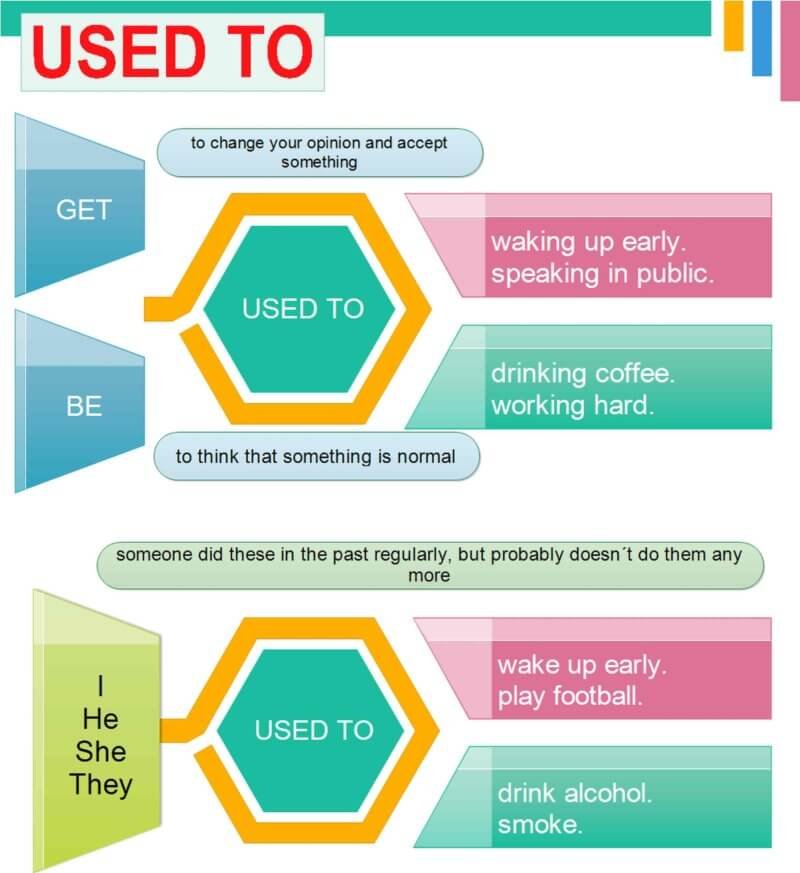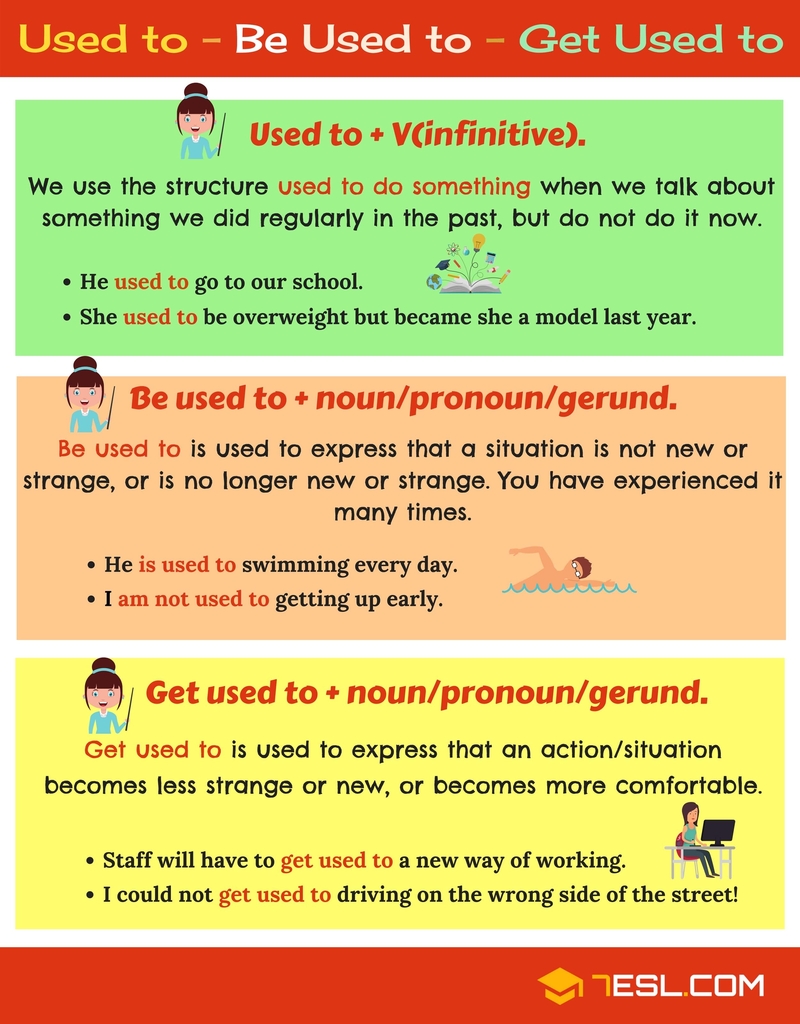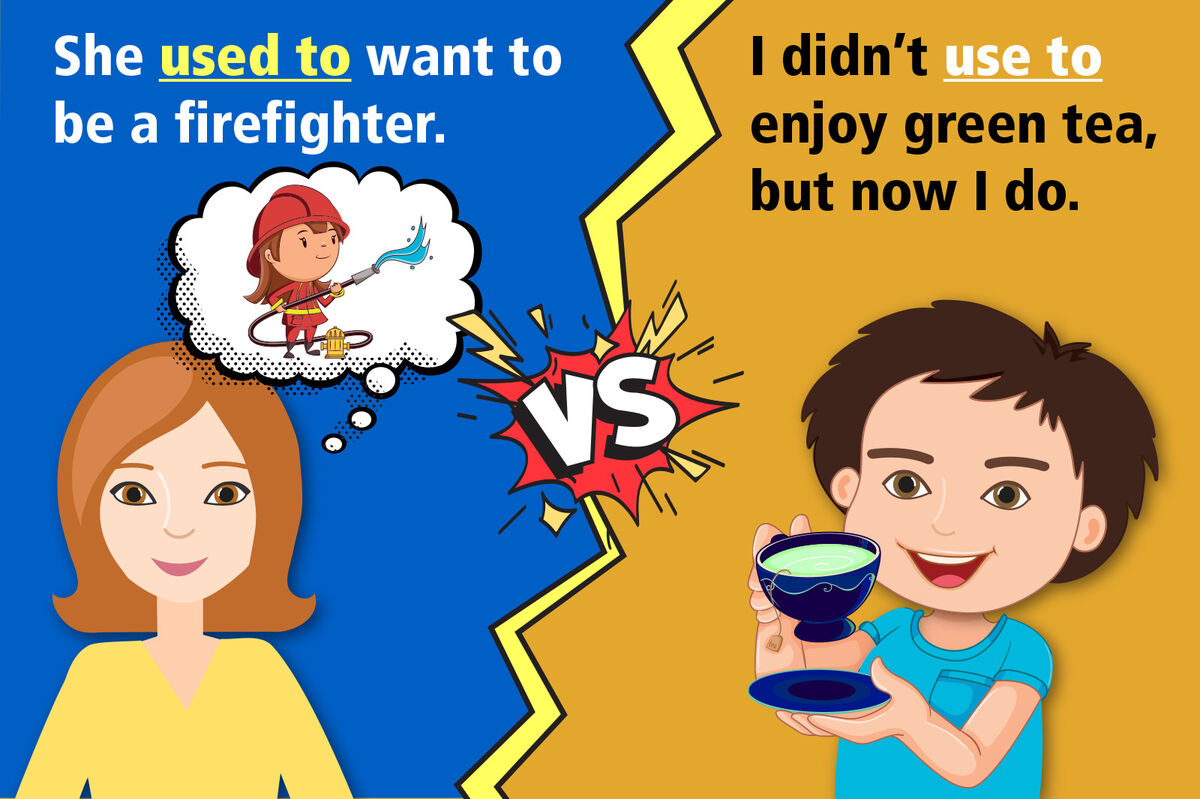When to Use "Used to" and "Would" My Lingua Academy

Difference between "Used to", "Be Used to" and "Get Used to" ESL Buzz
"Used To" Shows a Former Action, Habit, or Fact "Use" Followed by an Infinitive "Use To" vs. "Used To" as a Synonym for "Accustomed To" "Get Used to It"—How To Use It Correctly If you frequently mix up the phrases use to and used to, don't feel bad-it's a pretty common mistake!

differences used to,get used to, use… English ESL powerpoints
When to Choose Use To What does use to mean? Some writers substitute use to for used to as a synonym of formerly. However, this usage is incorrect. When forming this phrase as in I used to do this, used to is the only acceptable spelling. I used to be an architect. -not- I use to be an architect.

Used to, be used to, get used to TestEnglish
"Used to": Former Fact, Habit, or Action How do we write a sentence with " used to "? The format is: subject + used to + bare infinitive. For example: I used to smoke after dinner. It means I smoked after dinner in the past, but now I don't smoke anymore. I used to dance in my free time.

First Certificate in English Course Part 1 8.2. used to and would
Frequently confused words Use To or Used To | Difference & Example Sentences Published on 10 August 2022 by Eoghan Ryan . Revised on 15 February 2023. Used to and use to are related phrases that can have the same meaning but are used differently. Used to is a verb that indicates a past habit, action, or state.

Used To vs. Would ELA/EFL English Grammar Theory/Practice in Pictures
Grammar explanation Used to + infinitive and be / get used to + - ing look similar but they have very different uses. used to We use used to + infinitive to talk about a past situation that is no longer true. It tells us that there was a repeated action or state in the past which has now changed.

Used to, Get used to and Be used to Games to learn English
A closely related construction is get + used to, which is an idiomatic phrase meaning "become accustomed to.". When you use get + used to, it means that the process of habituation is still ongoing. It is also incorrect to write use to in this case. Horseback riding has been frightening for me, but I will get use to it.

differences used to,get used to, use… English ESL powerpoints
Perfect English Grammar. Download this explanation about 'used to' in PDF. 'Used to + infinitive': We use this expression to talk about habits or repeated actions in the past which we don't do in the present. We also use it to talk about states in the past which are no longer true. For example: I used to have long hair (but now I have short hair).

🆚What is the difference between "used to" and "get used to" ? "used to
A common mistake both for learners of English as well as native speakers is the difference between "Used to" and "Use to" and when (or if) we put the letter D at the end of the verb. First let's look at the meaning of it: Used to = an action or habit that was common in the PAST but not anymore. This should not be confused with

To vs. Too When to Use To or Too with Useful Examples • 7ESL Learn
To Be Used to & Use to: The Difference in English Grammar Many of my students have difficulty understanding the difference between be used to and use to. Do you know the difference? Try to complete these two sentences: When I was a child, I have blonde hair. Now, my hair is grey. Marco hot weather. He is from Spain. It's usually hot there.

"Used to" or "Use to" Differences And Grammar Rules
The difference between used to, be used, and get used to is: Used to is a verb we use to talk about something that happened in the past that doesn't happen anymore. We always use it in the past tense. Be/get used to is an adjective that means we are so familiar with something that is seems normal or usual. Just as with any adjective, we can.

To vs. Too When to Use To or Too with Useful Examples Efortless English
Used to - English Grammar Today - a reference to written and spoken English grammar and usage - Cambridge Dictionary

Used to vs Use to Differences and Grammar Rules YourDictionary
The phrase "used to" is unrelated to the other two phrases. But "be used to" and "get used to" have similar meanings and sentence structures. Some English learners have trouble distinguishing.

This That These Those, Using and Differences English Grammar Here
How do you use use to? It may help to remember that the majority of the time, the correct option is used to and not use to. However, there's one exception to the rule: if the auxiliary forms did / didn't is in the sentence, you would choose use to and not used to. For example: Didn't she use to play the flute?

Used to vs. Be Used to vs. Get Used to How to Use them Correctly ESLBUZZ
Used to is a verb used to indicate a past habit, action, or fact that is no longer the case. Used to functions similarly to a modal verb, meaning that it modifies the main verb of a clause. In this context, "used" is combined with the preposition "to" and the infinitive of a verb (e.g., "walk," "sing," "think"). Examples: Used to as a verb

When to Use "Used to" and "Would" My Lingua Academy
Grammar explanation When we talk about things in the past that are not true any more, we can do it in different ways. Used to + infinitive We can use used to to talk about past states that are not true any more. We used to live in New York when I was a kid. There didn't use to be a supermarket there. When did it open? Did you use to have a garden?

Grammar tip Use to vs. Used to CRC Marketing Solutions
Vocabulary Versus Spellings Use to or Used to: Know the Differences and Rules By Jennifer Gunner, M.Ed. Education , Senior Writer Updated June 2, 2021 Image Credits How do you describe an activity that you don't do anymore? It's hard to know whether you use to do it, or if you used to do it.